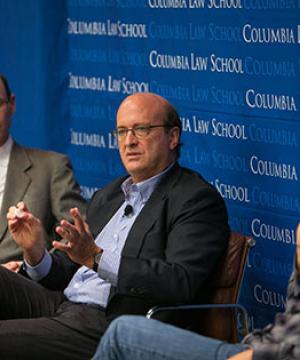Alibaba GC Tim Steinert ’89 Talks About Leading from Within
Steinert gives students an inside view of what it’s like to be general counsel at one of the world’s e-commerce giants.
Columbia Law students who aspire to work in China’s rapidly growing technology industry had an opportunity recently to get some advice from a lawyer who leads the legal team at one of the world’s internet giants.
Alibaba's general counsel and corporate secretary, Tim Steinert ’89, discussed what it takes to land that dream job and how to succeed once you get there during the inaugural session of the Dean’s Distinguished Speaker Series. The series, bringing accomplished legal thinkers and practitioners to campus, is part of an emerging initiative to foster leadership development, Gillian Lester, Dean and the Lucy G. Moses Professor of Law, told the gathering.
The aim is to “help students not only learn the law but also the qualities that strong leaders have that you can take with you when you graduate from Columbia Law School,” Lester said.
Steinert spent 18 years in private practice before joining Alibaba as the company’s top lawyer in 2007. In a wide-ranging conversation with Tim Wu, Isidor and Seville Sulzbacher Professor of Law, and Benjamin Liebman, the Robert L. Lieff Professor of Law and director of the Center for Chinese Legal Studies, Steinert discussed his career, the law in China and barriers to global business.
What follows are some of the takeaways from the 60-minute discussion.
The road runs through Wall Street
Law students who aim to work for a tech powerhouse in China might schedule a stop in Manhattan, according to Steinert. “Learning how to write a prospectus well comes from doing that over and over, and New York City is probably the best place to do that,” said Steinert, who helmed Alibaba’s 2014 IPO, which raised $25 billion.
When Wu asked how the path for lawyers eager to work in China has changed, Steinert noted that it is important now to find a firm or corporate legal department “where you’re dealing with challenging transactions and working with people who are really good at what they do."
Steinert logged three years following graduation at the law firm Coudert Brothers in Beijing. “Then I realized I needed to work on Wall Street because China was just starting to do initial public offerings and that was a skill set and a rigor that’s important,” Steinert recalled.
The realization led Steinert to the law firm Davis Polk & Wardwell in New York, where he worked before returning to Hong Kong as a partner at Freshfields, Bruckhaus and Deringer.
The buck stops with you
Transitioning to an in-house post from private practice can challenge even lawyers at the top of their game, said Steinert, who noted that he’s still making that transition.
“In the company the decision is yours,” Steinert explained. “You want to be well informed so you can say this choice is the right choice, and you have to have the guts to do that. That’s tough because you need to understand at least as much about his business and about other risk he is facing, and put it in the right context.”
Navigating a nascent legal system is a challenge
Liebman asked about the range of legal work Steinert handles at Alibaba, and how that differs from work in the United States. Interestingly, Steinert said that while he and his team often handle the same kinds of legal matters that Silicon Valley lawyers might encounter, the newness of the law and legal system in China is a challenge.
“The concept of a lawyer as a business partner and helping to plan in advance is still quite new,” Steinert explained. “That’s reflected at every level, from young people in our company who’ve never met a lawyer to senior people who may not appreciate the benefit of having a lawyer work for them in a commercial context.”
“We have quite a lot of work to do in educating people,” he added. “That can be frustrating, but when you’re successful in persuading people of the right way to do something, and they see you helped them accomplish it in a way that helps the company, that’s rewarding.”
Open your mind . . . and up your endurance
Wu, whose research and writing focus on technology, the internet, and antitrust, asked Steinert how China's tech economy compares to that of the United States. The giants, such as Alibaba, are “very outward looking and willing to try everything,” Steinert said, adding that people in China are more willing to be patient for success. “The average age of a lot of my colleagues is 28 . . . and they believe quite a lot in themselves,” Steinert said. “People work hard there, and in Silicon Valley, but on average, people there are willing to suffer longer to be successful.”
Stay friends with your friends
Steinert credits Joseph Tsai, Alibaba’s executive vice chairman and a friend of Steinert's from college, with being “instrumental” in his decision to join Alibaba after nearly two decades in private practice.
“I was ready for a change,” Steinert told Liebman, who asked what led him to make the jump. “I was starting to look around, and [Tsai] was looking for help . . . and the fact that I knew him and respected him personally, and respected his skills, helped.”
Watch:
:
Related reading
Alibaba Group GC Tim Steinert '89 Talks to Students About Company's IPO and Personal Career Path
Center for Chinese Legal Studies
###
Posted on Nov. 7, 2017
